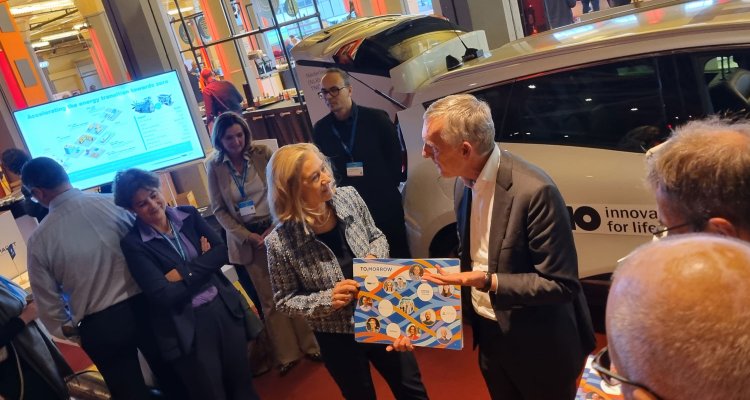
News
TO2 institutes launch impact report 2023
The impact report of the TO2 institutes TNO, WUR, Deltares, NLR and MARIN was recently published again. The 2023 magazine shows how the institutions are contributing to a sustainable, clean, healthy and safe future for the Netherlands. Research and accompanying solutions are presented in the magazine, which was produced in close cooperation with the Ministry of Economic Affairs and Climate.
Many of the studies are funded by the government and often co-funded by the end-users. The magazine shows what results were achieved by the TO2 institutes involved.
Societal themes
The articles follow the four societal topics defined by the mission-driven Top Sector and Innovation policy: 1. Energy transition and sustainability, 2. Agriculture, water and food, 3. Health and Health care and 4. Security. Space has also been given to showcase key technologies and an InnovationExpo.
"As a country, we continue to invest in research and innovation, both by the government and the business community. We aim to harness and apply our knowledge more extensively in various domains, including healthcare, energy, and agriculture. This is beneficial for the Netherlands and our planet. Moreover, in doing so, we are also shaping the jobs of the future. The TO2 institutes play a pivotal role in this endeavor. Together, we are building a future in which the Netherlands maintains its position as an innovation leader."- Micky Adriaansens, Minister of Economic Affairs and Climate in the magazine's foreword.
Below is a brief summary of the projects featured in the impact report where Wageningen University & Research played a significant role.
Water and Soil steered design in the Netherlands
In the Netherlands, we have grown accustomed to shaping the landscape according to our needs. New housing, renewable energy, food production, natural preservation, water management, and recreational spaces all compete for space in the Dutch landscape. However, we are confronted with limitations, evident in challenges such as the nitrogen crisis, climate change, declining biodiversity, and deteriorating water quality. To address these issues, we must work more intelligently with nature and leverage its services. The goal is to allow water and soil to guide our design decisions. For example, this could involve using the most fertile soils for food production and constructing new homes on higher ground due to rising sea levels. This redesign of the Netherlands may be radical, but it comes with numerous benefits on the longer term."
Better seeds for Africa
One in ten people worldwide suffers from food scarcity. Increasing crop yields and food production in Africa demands access to high-quality seeds of crops and varieties adapted to local conditions. WUR researchers contribute by collaborating with governments, research institutes, companies, NGOs, and farmers' organizations to ensure that African farmers have access to improved seeds. They adopt a sector-based approach, working in partnerships to advance research, implement technical innovations, and enhance coordination and seed policies. For instance, they explore new methods to expedite the registration and approval of new varieties for the market and strengthen the capacity of local companies in promoting these new varieties."
Farmers cause less peat degradation with high water levels
Peat soils in the Netherlands subside by approximately half a centimeter to one centimeter per year. This subsidence not only leads to tilted houses and waterlogged grasslands but also results in additional CO2 emissions due to peat degradation. WUR is conducting research to understand how elevated water levels can mitigate CO2 emissions and how dairy farms can adapt to such changes. The goal is to maintain the groundwater level in peatlands at twenty centimeters below ground level. WUR researchers anticipate that peat degradation will be reduced by a quarter compared to current levels. WUR is assessing the impact of groundwater levels on CO2 emissions in plots with and without water infiltration. It's also crucial to quantify the effects on business operations to calculate any potential economic disadvantages.
Landscape and avian flu
WUR has studied how landscape elements, farm types, and geographical locations contribute significantly to the risk of avian flu contamination in poultry farms. This knowledge can inform decision-making in the agricultural transition.
Healthy food in care and hospitality industry
In collaboration with other stakeholders, Wageningen University & Research conducted research on healthy food within the care and hospitality sectors. Providing a healthier and more sustainable food supply in the care service and hospitality industry results in increased satisfaction among clients and guests, as well as more motivated employees. These are some of the primary findings of the study.
Encourage bio-based construction with more information
Traditional construction materials like cement and steel generate significant CO2 emissions, whereas bio-based building materials, such as wood, sequester CO2. Bio-based construction materials are currently underutilized in the Netherlands. WUR aims to increase the adoption of bio-based construction materials by actively disseminating information regarding their environmental performance, certification, and availability through the Biobased Building Materials Catalog and the National Environmental Database. These resources list all currently available bio-based building materials along with practical applications. The objective is to encourage broader and more effective use of bio-based materials, with a focus on enhancing the production chain and certification. Additionally, WUR is engaged in the development of new building products, including bio-based asphalt, cement recycling, and bio-based construction panels.